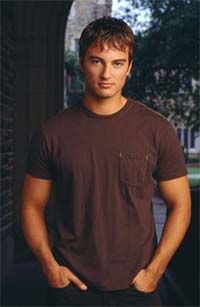
|
Media Matters
 The final episode of the program that many observers credit with putting the WB network on the media map aired last month. Dawson's Creek was the first series in television history to focus specifically on the sexual awakening of American teenagers, and the program sometimes attracted as many as 7 million viewers. To the program's credit, its content included the evolution of a teenage boy who stumbled through many of the real-world stages of coming to terms with being a gay man. The final episode of the program that many observers credit with putting the WB network on the media map aired last month. Dawson's Creek was the first series in television history to focus specifically on the sexual awakening of American teenagers, and the program sometimes attracted as many as 7 million viewers. To the program's credit, its content included the evolution of a teenage boy who stumbled through many of the real-world stages of coming to terms with being a gay man.
Jack McPhee-played by straight actor Kerr Smith-arrived at the fictitious Capeside High School during the program's second season, in 1999. The handsome and personable young man initially takes up with one of the female leads. But as the season unfolds, he comes to realize that his true feelings lie elsewhere. Some critics blasted how Dawson's Creek portrayed Jack's coming-out process, saying that he was depicted as the stereotypical "sad young gay man" who hates himself because of his sexuality. I disagree and applaud the program's realism. Specifically, the 16-year-old boy writes a revealing poem for his English class with the understanding that the work is for his teacher's eyes only. But the insensitive Mr. Peterson forces Jack to read his words aloud in class, including a description of a masculine image of perfection and references to "shackles of guilt" and being afraid of "what I could be." Jack is visibly shaken during the class, but the teacher persists. Yes, the reality is that some teachers can be that cruel. Next, some of the boy's homophobic classmates spray paint "Fag" on his locker, and later scenes show Jack tearfully acknowledging his homosexuality to his girlfriend and his non-supportive father. The two-episode storyline was not easy to watch, but it provided an accurate image of the kinds of painful experiences-according to numerous studies-that many gay teenagers are forced to endure. I also found it reassuring that one of Jack's friends, Pacey, comes to his rescue and confronts the teacher, showing that the boy has the support of his friends. And so, by the end of the second segment, Mr. Peterson is forced to resign from the faculty, presumably preventing him from inflicting more pain on other struggling students. During its third season, Dawson's Creek marched forward to break some gay stereotypes. Capeside's football team has suffered from a lengthy losing streak, so when the new coach sees how well Jack catches a ball, he recruits the young man to be his star wide receiver. The boy is initially reluctant-"A gay kid on the football team," he says to the coach. "Now if that isn't a written invitation for ridicule, what is?"-but his friend Jen encourages him to tough it out. After some initial hazing by his teammates, Jack gradually wins them over. That support becomes crucial during the first game of the season after a TV program about Jack airs and the members of the opposing team single him out-not so much because he's the best player but because he's gay-and repeatedly tackle him and then make sure he ends up on the bottom of the pile and gets lots of extra jabs and punches. By halftime, Jack is hurting and Capeside is getting slaughtered.
Seeing every guy on a high school football squad wearing make-up under his helmet so befuddles the other team that Jack is able to evade his tacklers and catch the ball for several touchdowns, thereby winning the big game. OK, so maybe this storyline has a tougher time wearing the mantle of realistic, but a TV program showed a gay boy as the star of a football game-so who cares! Dawson's Creek did not, however, consistently sugar coat the experiences of being a gay teenager. In one segment, Jack is fired from his job as a soccer coach because some parents don't want him around their little boys, and another time his friend Tobey is the victim of a gay bashing. In other words, Jack's life, like that of most of us, is a series of ups and downs. Again, Dawson's Creek should be lauded-unlike Will & Grace-for depicting some of the "ups" in a gay person's life as involving physical affection. The most significant storyline related to this topic plays out during the fourth season when Tobey asks Jack to be his date for their senior prom. They are joking and flirting and getting along well during the big event, until Tobey suggests that they take a spin on the dance floor. The prospect of such a public display frightens Jack, so he pulls back and says all they have is a platonic friendship. A few minutes later, though, Jack approaches Tobey, admits that he was scared and then says, "I'm not afraid anymore," and kisses his date-long and passionately. That kiss, which aired in May 2001, broke new ground. "I timed it," announced a gleeful Scott Seomin of the Gay and Lesbian Alliance Against Defamation. "It's like a 5 ½-second, mouth-to-mouth kiss. We haven't seen anything like this before on network TV." Greg Berlanti, an openly gay man who is executive producer of Dawson's Creek, was understandably proud of the segment. "A lot of kids out there deserve to see positive images of who and what they are," he said. After that remarkable segment, the program continued to depict Jack's advances and setbacks as a gay college student. In one episode, for example, the most prestigious fraternity on campus recruited the popular young man. But then when fraternity roommates were assigned by a lottery, the brother who was selected to live with Jack said he wasn't comfortable being in such closer quarters with a gay guy. The final episode in the series jumped five years into the future to show what had happened to the various teenage characters on the show when they were all grown up. Jack had finished college and was back at Capeside High School, teaching English in the same classroom where Mr. Peterson had treated him so callously a decade earlier. Jack's personal life had evolved as well, as he was in a serious relationship with the town's gay sheriff, and there were strong signals that the two men were about to adopt a baby girl. The men and women who created Dawson's Creek and shepherded it through six seasons should feel proud. They not only changed American television, but, at the same time, increased the quality of life for millions of gay young people who, for the first time, saw one of their own reflected on the TV screen. |
|
 It's then time for a couple of Jack's friends, Dawson and Jen, to come to his rescue once again. They smear mud on all the players' jerseys to obscure everyone's number and then persuade the entire team to wear rouge and eye shadow, so the home team quarterback is able to return to the field and jeer at the opposition: "Try to find the homo now!"
It's then time for a couple of Jack's friends, Dawson and Jen, to come to his rescue once again. They smear mud on all the players' jerseys to obscure everyone's number and then persuade the entire team to wear rouge and eye shadow, so the home team quarterback is able to return to the field and jeer at the opposition: "Try to find the homo now!"